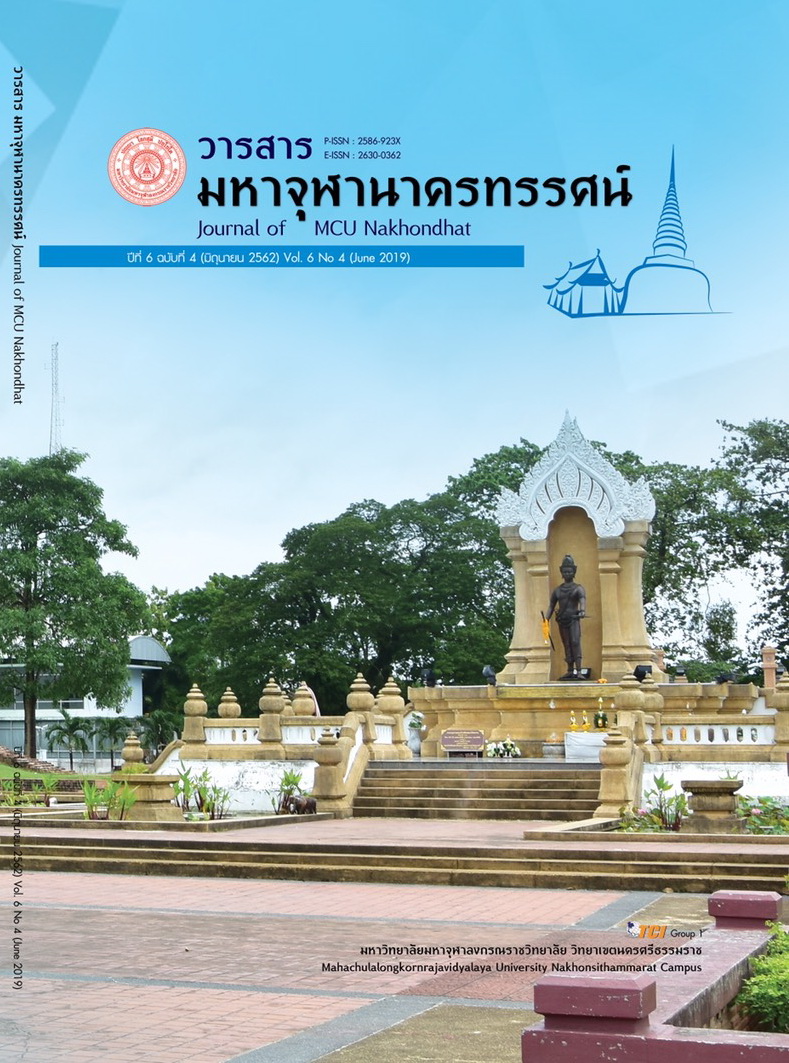STATES, PROBLEMS AND DEVELOPING GUIDELINES OF LEARNING ORGANIZATION IN THE LARGE SECONDARY SCHOOLS IN THE SPECIAL DEVELOPMENT ZONE OF THE SOUTHERN - BORDER PROVINCES
Main Article Content
Abstract
Objectives of this research were to study the states and problem on the learning organization of the large secondary schools in the southern border provinces specific extraordinary developing area, and to analyze the guideline of improving the learning organization of the individual components at large secondary schools in the southern border provinces specific extraordinary developing area by using the mixed method. Sample consisted of 249 teachers at 10 large secondary schools in southern border provinces specific extraordinary developing area. Research instruments were both the structural interview and questionnaire which was the estimated ratio scales. Qualitative data was the consensus analysis, while quantitative data analysis used with computer program. Statistics were frequency, percentage, and standard deviation.
Research results were found that:
- states of the learning organization of the schools both an overview and all of each aspect were in high levels.
2. The organization of learning of school has key issues. On Personal Mastery is the lack of compliances of parents and community. On Mental Models is the students learn by rote learning, and most of teachers teach with an emphasis on content. On Building Shared Vision is the most of teachers do not understand and have no participation in creating the vision of the schools. On Team Learning is the teachers lack the knowledge exchanging among them, and most of teachers adhere to their ego importantly. On Systems Thinking is the teachers do not use the teaching with integrated knowledge, and the teachers educate based on textbooks. And on Technology Application as the technology media is outdated, not in a good condition, and the teachers lack the skills to use media and technology. The improving guidelines on each side as on Personal Mastery, the schools should establish a network of parents to care for their students' behaviors. On Mental Models consist of the first issue is the teachers should educate the students how to learn from the practices, thinking learning, doing learning, calling that active learning. The second issue is the teachers in same groups of the learning contents should consult and teaching supervise each other. On Building Shared Vision. Schools should listen to the opinions of parents, teachers and school board, as well as related others for creating the vision of the school. On Team Learning has the first problem is the heads of the learning content groups should set the teacher groups to learning changing and teaching supervising each other regularly, and the second problem is schools should reiterate and advise the heads of the learning content groups for teachers in the learning content groups to sharing talking in the problem issues and finding the guidelines of solutions together regularly. The systems thinking has the first problem, schools should provide the training for teachers are competent in integrated teaching, and the second problem is the universities should modify the way of exam entrancing the university. In term of technology issue, the first problem is the schools should provide the technology media with a reasonable amount sufficient by budget and funding. The second problem, schools should provide the teacher training with the knowledge and ability to use technology for various teaching.
Article Details
References
กิตติ ศศิวิมลลักษณ์ และจิราพร วงศ์วุฒิ. (2558). การพัฒนาตัวแบบการเป็นองค์การแห่งการเรียนรู้ของสถาบันอุดมศึกษาเอกชนในเขตภาคเหนือ. วารสารวิทยาการจัดการสมัยใหม่, 8(1), 110-122.
กุศล ทองวัน. (2553). ความสัมพันธ์ของปัจจัยที่ส่งเสริมให้เกิดองค์กรแห่งการเรียนรู้ต่อระดับการเป็นองค์กรแห่งการเรียนรู้และระดับการเป็นองค์กรนวัตกรรม: กรณีศึกษาสำนักงานพัฒนาวิทยาศาสตร์และเทคโนโลยีแห่งชาติ. วารสารบริหารธุรกิจมหาวิทยาลัยสงขลานครินทร์, 33 (128), 37.
ชาฤนี เหมือนโพธิ์ทอง. (2554). การบริหารแบบมีส่วนร่วมกับการทำงานเป็นทีมของพนักงานครูในสถานศึกษาสังกัดเทศบาล กลุ่มการศึกษาท้องถิ่นที่ 1. วิทยานิพนธ์ปริญญาศึกษาศาสตรมหาบัณฑิต มหาวิทยาลัยศิลปากร.
เดชดนัย จุ้ยชุม และคณะ. (2559). การพัฒนาผลสัมฤทธิ์ทางการเรียน เรื่อง ทักษะการคิดของนักศึกษาในรายวิชาทักษะการคิด (Thinking Skills) ด้วยการเรียนรู้แบบมีส่วนร่วม (Active Learning). วารสารมหาวิทยาลัยนราธิวาสราชนครินทร์ สาขามนุษย์ศาสตร์และสังคมศาสตร์, 3(2), 48-57.
พรศักดิ์ สุจริตรักษ์. (2551). ตัวบ่งชี้การบริหารสถานศึกษาที่ส่งเสริมทักษะการคิดของนักเรียน. ดุษฎีนิพนธ์ปรัชญาดุษฎีบัณฑิต มหาวิทยาลัยศิลปากร.
ลิลิต วรวุฒิสุนทร. (2558). ปัญหาอมตะครูไทย เร่งแก้ก่อนการศึกษาดำดิ่ง. เรียกใช้เมื่อ 4 พฤษภาคม 2561 จาก โพสต์ทูเดย์: https://www.posttoday.com/ politic/report/341473
วิจารณ์ พานิช. (2555). วิถีสร้างการเรียนรู้เพื่อศิษย์ในศตวรรษที่ 21. กรุงเทพมหานคร: ตถาตาพับลิเคชั่น.
วิทยากร เชียงกูล. (2559). รายงานสภาวะการศึกษาไทยปี 2557/2558 จะปฎิรูปการศึกษาไทย ให้ทันโลกในศตวรรษที่ 21 ได้อย่างไร. กรุงเทพมหานคร: พิมพ์ดีการพิมพ์.
สาธิต วงศ์อนันต์นนท์. (2557). การปฏิรูปการศึกษาไทย : อดีต ปัจจุบัน อนาคต. เข้าถึงได้จาก ห้องสมุดอิเล็กทรอนิกส์วุฒิสภา - สภานิติบัญญัติแห่งชาติ: http://library.senate. go.th/document/Ext8665/8665180_0002.PDF
สำนักงานเลขาธิการสภาการศึกษา กระทรวงศึกษาธิการ. (2552). การพัฒนาการศึกษาในเขตพัฒนาพิเศษเฉพาะกิจจังหวัดชายแดนภาคใต้. กรุงเทพมหานคร: พิมพ์ดีการพิมพ์.
สำนักงานเลขาธิการสภาการศึกษา กระทรวงศึกษาธิการ. (2560). แผนการศึกษาแห่งชาติ พ.ศ.2560–2579. กรุงเทพมหานคร: พริกหวานกราฟฟิค.
สำนักพัฒนาครูและบุคลากรการศึกษาขั้นพื้นฐาน สำนักงานคณะกรรมการการศึกษาขั้นพื้นฐาน กระทรวงศึกษาธิการ. (2560). คู่มือประกอบการอบรมการขับเคลื่อนกระบวนการ PLC (Professional Learning Community) “ชุมชนการเรียนรู้ทางวิชาชีพ” สู่สถานศึกษา. กรุงเทพมหานคร: กระทรวงศึกษาธิการ.
สุนันท์ นิลพวง. (2559). แนวทางการบริหารการศึกษาเพื่อพัฒนาโรงเรียนสู่ องค์การแห่งการเรียนรู้ ในมุมมองของครูสำนักงานเขตพื้นที่การศึกษามัธยมศึกษาเขต 8. วารสารสมาคมนักวิจัย, 21(1) , 122-134.
เสริมศักดิ์ วิศาลาภรณ์และคณะ. (2550). สภาพการจัดการศึกษาในจังหวัดชายแดนภาคใต้. กรุงเทพมหานคร: ห้างหุ้นส่วนจำกัด วี.ที.ซี. คอมมิวเคชั่น.
หทัยกาญจน์ สำรวลหันต์. (2549). การพัฒนารูปแบบการเรียนรู้แบบบูรณาการโดยใช้แหล่งเรียนรู้เรื่อง ถลกบาตรสำหรับนักเรียนชั้นมัธยมศึกษาปีที่ 2. วิทยานิพนธ์ปริญญาศึกษาศาสตรมหาบัณฑิต มหาวิทยาลัยศิลปากร.
อภิรัฐ บุญศิริ. (2559). วิถีชีวิตของครอบครัวกับผลกระทบจากเหตุการณ์ ความไม่สงบชายแดนใต้ กรณีศึกษาเขตพื้นที่พัฒนาพิเศษเฉพาะกิจชายแดนใต้จังหวัดสงขลา ตั้งแต่ พ.ศ.2547- พ.ศ.2557. วารสารมนุษยศาสตร์สังคมศาสตร์ มหาวิทยาลัยทักษิณ, 11(1), 238–253.
Cronbach, L. J. (1990). Essentials of Psychological Testing. Harper Collins Publishers, (5th ed.).
Krejcie, R. V., & Morgan, D. W. (1970). Determining Sample size for Research Activities. Educational and Psychological Measurement, 30(3), 607-610.
Marquardt, M. J., & Reynolds, A. (1994). The Global Learning Organizatio. Burr Ridge: III : Richard D. Irwin, Inc.
Senge, Peter M. (2006). The Fifth Discipline : The art & practice of the learning organization. New York: Currency Doubleday.


